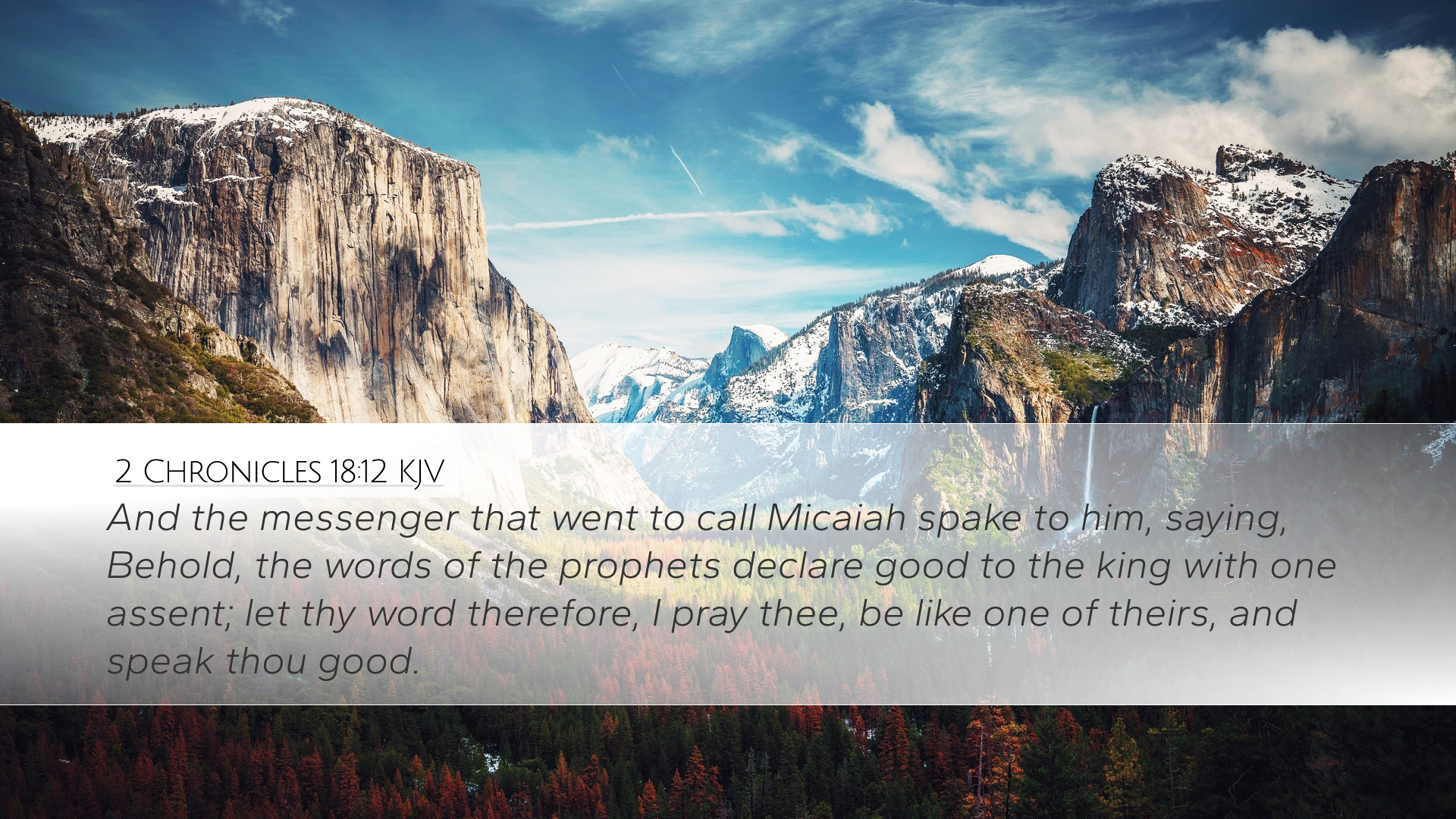Commentary on 2 Chronicles 18:12
Verse Reference: 2 Chronicles 18:12 - "And the messenger that went to call Micaiah spake to him, saying, Behold, the words of the prophets declare good unto the king with one assent: let thy word therefore, I pray thee, be like one of theirs, and speak thou good."
Introduction
The context of 2 Chronicles 18 involves the alliance between King Jehoshaphat of Judah and King Ahab of Israel. This chapter reveals significant theological themes, including the interaction between divine prophecy, human agency, and the dangers of peer pressure in spiritual matters. The verse at hand highlights the pressure exerted on the prophet Micaiah to conform to the favorable prophecies being delivered by Ahab's prophets.
Contextual Background
- Jehoshaphat and Ahab's Pact: Jehoshaphat's alliance with Ahab through marriage underscores the complexities of ungodly alliances. Despite his commitment to the Lord, Jehoshaphat's association with Ahab puts him in a morally ambiguous position.
- The Role of Prophets: Prophets played an essential role in guiding the kings of Israel and Judah. Micaiah, on the other hand, stands out as a lone voice against a backdrop of consensus among false prophets.
- Peer Pressure in Spiritual Matters: The messenger's appeal to Micaiah to conform to popular opinion symbolizes the human tendency to seek approval from others, especially in matters concerning God’s truth.
Theological Insights
This verse raises questions about the integrity of prophetic voice amid societal and political influences.
- Divine Sovereignty vs. Human Influence: Micaiah's ministry demonstrates the tension between adhering to God's truth and the pressures to conform to popular beliefs. The request for Micaiah to align with other prophets illuminates the often difficult choice between faithfulness to God's message and the desire for human acceptance.
- The Importance of Truth: Micaiah’s response to the messenger and the subsequent details of his prophecy ultimately emphasize that God’s truth must be spoken, regardless of the risk of public disapproval or personal peril.
Commentary Highlights
Matthew Henry Commentary
Matthew Henry emphasizes the significance of Micaiah’s role as a prophet and the integrity he displayed in his ministry. Henry articulates that the messenger’s request is an attempt to coax Micaiah into compromising his prophetic integrity.
Albert Barnes Commentary
Barnes elaborates on the boldness of Micaiah against the backdrop of overwhelming conformity. He notes that the fact that the messenger stressed the unity of the false prophets highlights a common theme in spiritual warfare—the pressure to conform to the majority even at the expense of truth.
Adam Clarke Commentary
Clarke focuses on the character of prophetic ministry, citing that true prophets like Micaiah must often stand alone. He discusses the moral courage required for a prophet to deliver an unpopular message, asserting that faithfulness to God's word is paramount.
Practical Applications
- Standing Firm in Truth: Modern believers should take courage from Micaiah’s example when faced with societal pressures to abandon biblical truths.
- Ministry Integrity: Pastors and leaders must prioritize integrity over popularity, recognizing that God’s favor is more critical than human applause.
- Encouraging a Prophetic Voice: The church must encourage communities to value prophetic voices that challenge complacency and demand adherence to God’s truth.
Conclusion
2 Chronicles 18:12 serves as a crucial lesson about the importance of prophetic integrity amid overwhelming pressure. The pressure faced by Micaiah to conform to the popular narrative reinforces the necessity for believers, especially leaders, to remain steadfast in proclaiming God's truth. In a world ripe with conflicting voices, the call remains the same: speak the truth boldly, even if it stands in stark contrast to society's chorus.


